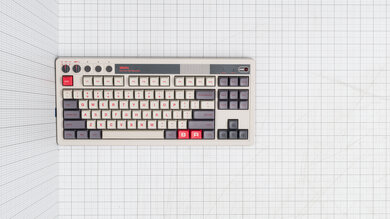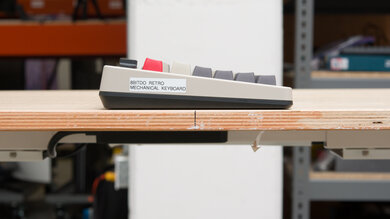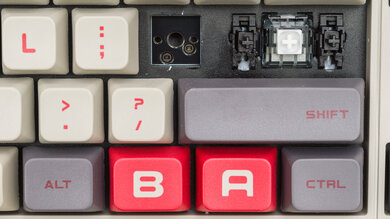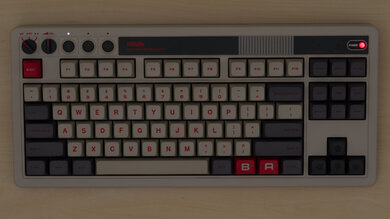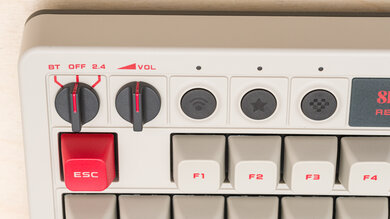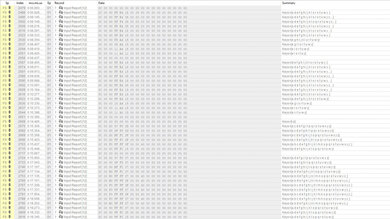The 8BitDo Retro Mechanical Keyboard is a tenkeyless (80%) wireless keyboard. Its design is heavily influenced by retro game consoles, particularly the Nintendo Entertainment System (NES) and Famicom systems, on which its two available colorways take their inspiration. You can connect this keyboard wirelessly via Bluetooth or with its included 2.4 Ghz USB receiver. Its keycaps are made of dye-sublimated PBT plastic, and it uses clicky Kailh Box White V2 mechanical switches, which are fairly lightweight clicky switches with a satisfying sound profile reminiscent of retro keyboards.
Additionally, this keyboard comes with a separate gamepad module with two large, circular buttons called the 8BitDo Dual Super Buttons. This module uses heavier, Gateron clicky Green switches and plugs into a 3.5 mm jack at the back of the keyboard. There are four 3.5mm jacks if you want to connect additional 8BitDo Dual Super Button modules that 8BitDo sells separately.
Our Verdict
The 8BitDo Retro Mechanical Keyboard is decent for all-around gaming and well-suited for retro gaming. It has great build quality and impressive latency performance. It connects wirelessly with its USB receiver or via Bluetooth, and it includes a separate 8BitDo Dual Super Button gamepad module for added inputs. You can also remap buttons directly on the keyboard or using the configuration software. Unfortunately, this keyboard lacks backlighting, and while the stock clicky switches are very stable and satisfying to game on, they make higher-pitched clicking noises that can disrupt those around you.
- Great build quality.
- Impressive all-around latency performance.
- Available in two retro-inspired colorways.
- Fairly loud; may disrupt those around you in closed spaces.
- Latency performance is somewhat inconsistent compared to many dedicated gaming keyboards.
The 8BitDo Retro Mechanical Keyboard is passable for office use. It has impressive build quality and connects wirelessly with a USB receiver or Bluetooth. Unfortunately, it doesn't support multi-device pairing, and the stock clicky switches make high-pitched clicking noises and are very likely to disrupt those around you in an open office setting.
- Great build quality.
- Connects wirelessly via USB receiver or Bluetooth.
- Available in two retro-inspired colorways.
- Fairly loud; may disrupt those around you in closed spaces.
- The Box White V2 switches are fairly lightweight compared to other clicky switches but on the heavier side for long typing sessions.
- Doesn't support multi-device pairing.
The 8BitDo Retro Mechanical Keyboard is sub-par for mobile and tablet use overall. It's considerably heavier and more bulky than most dedicated mobile keyboards. Additionally, its stock switches are quite loud and make higher-pitched clicking noises that can disrupt those around you in closed spaces. It has impressive build quality and connects wirelessly via Bluetooth or a USB receiver.
- Great build quality.
- Doesn't support multi-device pairing.
- Not very portable as it's quite large, bulky, and somewhat heavy.
The 8BitDo Retro Mechanical Keyboard is adequate for programming use. It has impressive build quality, and you can record simple macros directly on the board itself or using the configuration software. It doesn't have backlighting, so you may have difficulty reading key legends in darker rooms. It also lacks multi-device pairing, and while the stock clicky switches are satisfying to type on and very stable, the high-pitched clicking noises they make will likely disrupt people working around you.
- Great build quality.
- Connects wirelessly via USB receiver or Bluetooth.
- Available in two retro-inspired colorways.
- Fairly loud; may disrupt those around you in closed spaces.
- The Box White V2 switches are fairly lightweight compared to other clicky switches but on the heavier side for long typing sessions.
- Doesn't support multi-device pairing.
- No backlighting.
The 8BitDo Retro Mechanical Keyboard performs poorly in an entertainment or home theater setup. It connects wirelessly via a USB receiver or Bluetooth but doesn't support multi-device pairing. It's also quite bulky and somewhat heavy, and it lacks any backlighting, so you can't read the key legends in a darker room. Lastly, while it has a dedicated volume knob, it lacks any dedicated media keys out of the box.
- Great build quality.
- Doesn't support multi-device pairing.
- Not very portable as it's quite large, bulky, and somewhat heavy.
- No backlighting.
The 8BitDo Retro Mechanical Keyboard offers excellent raw performance with impressively low single-key and multi-key latency. However, this latency performance is also somewhat inconsistent compared to most other dedicated gaming models. It also supports full N-key rollover and has remarkably good chord-split performance. This makes it an outstanding candidate for playing rhythm games, games with two players on the same keyboard, or games requiring many simultaneous inputs.
- Impressive all-around latency performance.
- Remarkably good chord split performance.
- Latency performance is somewhat inconsistent compared to many dedicated gaming keyboards.
Changelog
-
Updated May 13, 2025:
We've reworked the Differences Between Variants section of this review to include new variants of this keyboard.
- Updated Dec 08, 2023: We've converted this review to Test Bench 1.3.1, which adds a new estimated PCB latency test to the Single-Key Latency section and a new Analog test to the Switches section of this review. You can see the full changelog here.
- Updated Nov 30, 2023: Review published.
- Updated Nov 02, 2023: Early access published.
Check Price
Differences Between Sizes And Variants
The 8BitDo Retro Mechanical Keyboard is available in several different editions. See the table below for their differences.
We bought and tested the N Edition, and you can see the label for our unit here.
| Variant | Colorway | Switches | Additional Modules | RGB Backlighting | Battery Size | Keycaps |
|---|---|---|---|---|---|---|
| C64 Edition | Beige/brown/red | Kailh Box White V2 | 8BitDo Dual Super Buttons, 8BitDo Super Stick | No | 2000mAh | Double-shot ABS, SA profile |
| N Edition | White/gray/red | Kailh Box White V2 | 8BitDo Dual Super Buttons | No | 2000mAh | Dye-sub PBT, MDA profile |
| Fami Edition | White/red/black | Kailh Box White V2 | 8BitDo Dual Super Buttons | No | 2000mAh | Dye-sub PBT, MDA profile |
| M Edition | White/gray/blue | Kailh Box White V2 | 8BitDo Dual Super Buttons | No | 2000mAh | Dye-sub PBT, MDA profile |
| Xbox Edition | Translucent green | Kailh Jellyfish X | 8BitDo Dual Super Buttons | Yes | 4000mAh | Double-layered ABS with matte UV coating |
Popular Keyboard Comparisons
The 8BitDo Retro Mechanical Keyboard is a tenkeyless wireless gaming keyboard. It's different from most dedicated gaming keyboards in several ways. Most obviously, this keyboard comes in two different early console-inspired colorways. This keyboard also comes stock with clicky switches, which are a bit heavier-feeling than the lightweight, linear options commonly found on many gaming models—but they provide a clacky mechanical sound and feel reminiscent of retro, 1980s keyboards. There's also a separate gamepad module included that has two large circular buttons and connects to the back of the keyboard with a 3.5mm plug. This keyboard also lacks backlighting, which is somewhat uncommon compared to most other dedicated gaming models.
Altogether, this keyboard isn't just designed to look the part: it delivers impressive all-around wireless latency performance, making it more than capable of playing recent titles and retro games. It also supports full-n-key and provides remarkably good chord-split performance, so it's particularly well-suited for playing titles in any genre that require lots of simultaneous inputs and can even register inputs from two people using the keyboard simultaneously without issue.
For more recommendations, see our picks for the best keyboards, the best wireless keyboards, and the best mechanical keyboards.
The SteelSeries Apex 7 TKL and the 8BitDo Retro Mechanical Keyboard are gaming keyboards with tenkeyless layouts. The SteelSeries is a wired-only model with a more conventional look and full RGB backlighting. It comes with your choice of linear, tactile, or clicky mechanical switches. The 8BitDo is a wireless model that connects with a USB receiver or via Bluetooth. It has a retro-inspired look with higher-quality PBT keycaps and a hot-swappable PCB that allows you to change out the stock clicky switches if you want. It also has a separate two-button gamepad module but doesn't have backlighting.
The SteelSeries Apex Pro TKL (2023) and the 8BitDo Retro Mechanical Keyboard are gaming keyboards with tenkeyless layouts but are otherwise very different. The SteelSeries has better overall performance and uses hall-effect switches that allow you to adjust individual keys' actuation and reset distance. The 8BitDo has a much more retro-inspired look and feel and uses clicky mechanical switches. It also includes a separate two-button gamepad module. The SteelSeries also has full RGB backlighting, which the 8BitDo lacks.
The Obinslab Anne Pro 2 and the 8BitDo Retro Mechanical Keyboard are both wireless mechanical keyboards. The Obinslab is smaller, with a compact (60%) layout. It has a more conventional, straightforward look, and it's available in a range of mechanical switches, including Cherry MX, Kailh, and Gateron options. It also has backlighting, which the 8BitDo lacks. On the other hand, the 8BitDo has a larger, tenkeyless layout and a more distinct, retro-inspired look. It only comes with clicky Kailh switches, but it has a hot-swappable PCB that allows you to change out the stock switches without soldering, a feature the Obinslab lacks. The 8BitDo also comes with a separate two-button gamepad module.
The Logitech G PRO X Keyboard and the 8BitDo Retro Mechanical Keyboard are both wireless gaming keyboards with tenkeyless layouts and hot-swappable PCBs. The Logitech has better overall gaming performance. It comes in linear, clicky, or tactile mechanical switch options. It also has backlighting, which the 8BitDo lacks. The 8BitDo has a more retro look and comes with clicky switches. It also includes a separate two-button gamepad module and supports Bluetooth connectivity, while the Logitech doesn't.
Test Results

The 8BitDo Mechanical Keyboard has a TenKeyLess (80%) form factor, so it lacks a Numpad but has a dedicated set of arrow keys, a navigation cluster, and a full function row. This keyboard has several additional controls and an LED power indicator above the function row, so it has slightly more depth than many other tenkeyless gaming models.
This keyboard also comes with a separate 8BitDo Dual Super Button gamepad module. You can see the dimensions of this gamepad module on 8BitDo's website here.
This keyboard has great build quality. It's made entirely of plastic, but it doesn't feel cheap, and there's only noticeable flexing near the keyboard's top edge. The keycaps are made of dye-sublimated PBT plastic with a pleasant, slightly textured finish, and the keys themselves are very stable while typing, even on larger keys with stabilizers.
The four rubber feet on the backside of the keyboard do a decent job of keeping it in place while typing. However, the keyboard does slide around if you accidentally nudge it
Unfortunately, the unit we bought and tested has what sounds like a loose part inside the keyboard that rattles around if you shake the board. You can see a video here. That said, this could very well be an isolated issue. We haven't seen other people reporting this or other significant build quality concerns online, but we'll keep on the lookout and update our review if needed.
This keyboard includes a separate 8BitDo Super Button gamepad module. Overall, this module feels sturdy and has a bit of foam padding inside to soften the impact when you bottom out the switches. Unfortunately, these buttons also wobble significantly when you press them.
The 8BitDo Retro Mechanical Keyboard has acceptable ergonomics. It has a fairly thick design with a fixed incline. It also doesn't include a wrist rest. That said, the keyboard's MDA keycap profile is slightly lower than conventional OEM profile keycaps, and they have fairly wide and flat tops, making them a bit easier to reach without angling your wrists too steeply. That said, we recommend using this keyboard with a wrist rest if you plan on gaming or typing for long stretches.
This keyboard provides excellent hardware customizability. Its hot-swappable PCB allows you to change the stock switches for any 3- or 5-pin Cherry-style switches without soldering. Additionally, the switches have standard cherry-MX style stems, and the right-side modifier keys are 1.25u-sized, providing good compatibility with aftermarket keycap sets. Just note that the switch orientation is north-facing, which can cause interference with some Cherry MX-style sets.
The 8BitDo Mechanical Keyboard comes with a rubber USB-A to USB-C charging cable. It retains some kinks from its packaging.
This keyboard has a 2000mAh battery, and 8BitDo advertises a battery life of 200 use hours with four hours of charging time. 8BitDo doesn't explicitly state if this is the maximum estimated battery life using a USB receiver or Bluetooth connection. Based on similar keyboards we've tested with the same battery size, we expect this is a maximum estimate while using a Bluetooth connection.
Using the 2.4Ghz wireless receiver ensures the best possible latency performance, but we also expect it to significantly reduce the maximum battery life estimate. If you have this keyboard and would like to share your experience with its battery life, reach out to us in the discussions.
The Power LED in the top right corner of the board indicates power levels with a solid light when fully charged, a breathing light when charging, and a blinking light when low on battery.
The 8BitDo Mechanical Keyboard has a total of four dedicated macro keys: an 'A' and 'B' button located on the bottom row of the keyboard between the spacebar and the arrow keys and the two large buttons on the separate 8BitDo Dual Super Buttons module.
You can remap these macro keys directly on the keyboard or using the configuration software. However, you can only record fairly simple hotkey-style macros with up to six non-repeating inputs.
This keyboard has a range of expected extra features, including LED indicator lights and a Windows Key lock. While there are no dedicated media keys out of the box, there is a dedicated volume knob. Additionally, you can program keys to perform media functions using the configuration software if desired. You can also remap keys and create simple macros directly on the keyboard or using the configuration software.
This keyboard also comes with a separate gamepad module called the 8BitDo Dual Super Buttons. This gamepad has two large circular buttons and connects to the keyboard via a 3.5mm jack on the back. You can connect a maximum of four Dual Super Button modules, which are sold separately on 8BitDo's website here.
For a more set of complete instructions, you can see a digital version of this keyboard's user manual on 8BitDo's website here.
This keyboard offers good typing quality. The alphanumeric keys are quite stable, while the larger keys with stabilizers exhibit only minor wobbling. The stabilizers are also pre-lubed and don't emit any noticeable rattling sounds.
The keys have standard spacing, and the keycaps are made of dye-sublimated PBT plastic with a slightly textured finish. The keycaps have an uncommon MDA-like profile and feature fairly wide, flat tops. The plastic also feels quite thick and substantial, reinforcing the retro inspiration.
This keyboard comes with clicky Kailh Box White V2 switches, which have a moderate tactile bump and make satisfying clicking noises on both the downstroke and upstroke. They're fairly lightweight compared to most other clicky switches and have quite short pre-travel, making them feel responsive and well-suited for gaming. That said, they're still noticeably heavier feeling compared to many linear or tactile switch options, so they may tire out your fingers if you also plan on typing with this keyboard for long stretches.
While this keyboard's average loudness is fairly good, the stock clicky Kailh Box White V2 switches make higher-pitched clicking sounds while typing. This sound profile is reminiscent of retro keyboards, and some find it very satisfying, but it can be disruptive if you're gaming or typing around other people in a closed space.
This keyboard uses Kailh Box White V2 mechanical switches. The PCB is also hot-swappable, so you can change the stock switches for other switches.
The additional gamepad module that comes with this keyboard uses clicky Gateron Green switches for its circular buttons.
If you're interested in more in-depth switch testing, we've reviewed the Kailh Box White V2 mechanical switches separately. See our review here.
The 8BitDo Mechanical Keyboard has Kailh Box White V2 mechanical switches. These are clicky switches with a click bar design, making a signature click sound on both the downstroke and the upstroke. Their overall sound profile is reminiscent of louder, clacky-sounding retro keyboards from the 1980s.
They have quite a short pre-travel distance, making them feel quite responsive. They're also comparatively lightweight-feeling with only a moderate tactile bump to overcome compared to most clicky switch options, making them better suited for longer gaming sessions. That said, they're noticeably heavier-feeling than most linear switches and offer more tactile resistance than many tactile switches.
If you're interested in more in-depth switch test results, we've reviewed Kailh Box White V2 switches separately. You can see our review here.
The additional gamepad module that comes with this keyboard uses clicky Gateron Green switches under its circular buttons. These switches are heavier and louder than the Kailh Box White V2 switches. Unfortunately, they're noticeably less stable, and the buttons they sit under wobble significantly when you press them.
The 8BitDo Mechanical Keyboard has excellent single-key latency and is suitable for playing games in any genre. This latency performance is somewhat more inconsistent compared to most dedicated gaming keyboards. This inconsistency is very minor and isn't noticeable in-game. That said, if you're exclusively interested in playing competitive titles, we recommend that you consider a keyboard with lower, more consistent latency performance.
The 8BitDo keyboard has good multi-key latency performance, making it a good choice for playing games that require additional keystrokes while multiple keys are pressed and held. Its key press and key release performance is somewhat more inconsistent compared to most dedicated gaming keyboards.
This keyboard provides excellent data transmission performance as its polling rate matches its effective update rate. It can also send multiple inputs per USB report and supports full N-key rollover. It's well-suited for playing games that register many simultaneous inputs or local multiplayer games with two people on the same keyboard.
The 8BitDo Mechanical Keyboard has outstanding chord split performance with exceptionally low and consistent 4-chord and 8-chord split delay. It's a superb keyboard for playing rhythm games that require multiple simultaneous keypresses.
This keyboard uses 8BitDo Ultimate Software V2 configuration software. This straightforward software offers a small selection of expected customization settings, including key remapping, macro recording, key disabling, and custom profiles.
This keyboard is fully compatible with Windows, macOS, and Linux. However, the software is only compatible with Windows. That said, you can set custom key assignments (media keys, for example) using the configuration software in Windows. If you then save your custom settings to the keyboard's onboard memory, they function as expected when you use the keyboard in macOS or Linux.
On macOS, the F11 key minimizes your current window. The Scroll Lock and Pause keys adjust screen brightness if you're using an Apple display. The Insert registers as a 'Home' key, and the Print Screen key does nothing. On Linux, all key functions work as expected.
This keyboard is fully compatible with Android, iOS, and iPadOS devices. However, there's no configuration software available for these operating systems. That said, you can set custom key assignments (media keys, for example) using the configuration software on a Windows PC. If you save these custom settings to the keyboard's onboard memory, they function as expected when you use the keyboard with mobile devices.
all key functions work as expected on Android. On iOS and iPadOS, the Print Screen and Insert keys do nothing.

